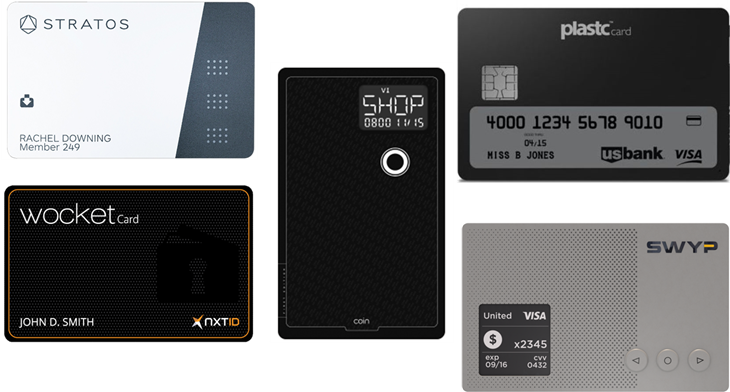NOTICE: This post references card features that have changed, expired, or are not currently available
On Monday, TechCrunch reported that Stratos is shutting down, but they may have jumped the gun. Stratos Card is one of several competing devices that are designed to let consumers leave their many credit cards at home. The devices differ in their specifics, but generally the consumer loads all of their credit cards onto their smart phone and then selects a smaller number of these cards to be loaded onto the digital credit card (which looks a bit like a regular credit card). When the consumer goes to use the card, they select which credit card they want to be active for that transaction and then the card should work just like a credit card thereafter (keyword is “should”).
I first wrote about the Stratos Card two and half years ago when it was named Echo. Now, according to The Verge, Stratos has been sold to a smart card company called Ciright One LLC, The Verge reported:
Stratos was struggling, and the company lost a recent round of funding, so Olson paused operations and looked at restructuring. He then struck a deal with Ciright One, a Pennsylvania-based smart card company that has been working on a very similar idea to the Stratos card.
The Smart Card / Digital Wallet contenders
A number of companies produce (or say they will soon produce) digital wallet cards. I’m sure that many readers of this blog juggle lots of credit cards, and are attracted to the idea of these cards, even if they know that those cards are not yet ready for prime time.
My goal is to try out all of these cards to see if any really work as advertised, and are really worth their steep prices (generally $100 and up), but so far I’ve only gotten my hands on two of them: Wocket Card and Coin 2.0.

I plan on writing up my experience with Coin 2.0 soon (Coin is the middle card in the picture above). The Wocket Card, though, is so bad that I don’t know if I can bear to write a whole post about it. We’ll see.
As to the other cards…
SWYP (shown above, bottom right) now says that they will begin shipping batch 2 cards (I didn’t get in on batch 1) in early summer 2016. As to Plastc (shown above, top right), their last email blast on the topic said that they would ship on April 29, 2016. I won’t be surprised if that date gets pushed back too.
As to the Stratos Card, it will be interesting to see what the new owners do with it. In a recent conversation with Stratos’ CEO, I was told that they didn’t have plans to incorporate an EMV chip and would rely instead on contactless payments. This is the same approach taken by Coin and I’ve found that it has serious limitations. I’m hoping that the new owners have a better solution in mind. I’d also like to see an e-ink display to make it clear which credit card is currently active at any given time. Currently, Stratos is the only serious digital wallet contender without one.





[…] that I’m aware of. These will be valid business expenses for the blog. As I reported before, Stratos encountered financial difficulties and had to sell its business, so I’m not holding my breath on that one. Wocket was the first card to arrive, but it is an […]
FM,
I am thinking to get coin 2.0 from amazon, but i found out that they will not engrave your name with it anymore.
How is your experience with it going to walmart and etc?
I wasn’t aware that they had stopped adding your name to their cards. Are you sure about that? I’ll do a full review soon, but just so you know, it does not work well in stores like Walmart or Target since those stores accept chip cards, but do not accept contactless payments.
Would love to read a comparison piece.
If these cards focus only on contactless payments, they’d really have no advantage over a conventional iPhone / Android, right?
That’s true, but there are some cards that don’t yet support things like Apple Pay whereas they do work with Coin